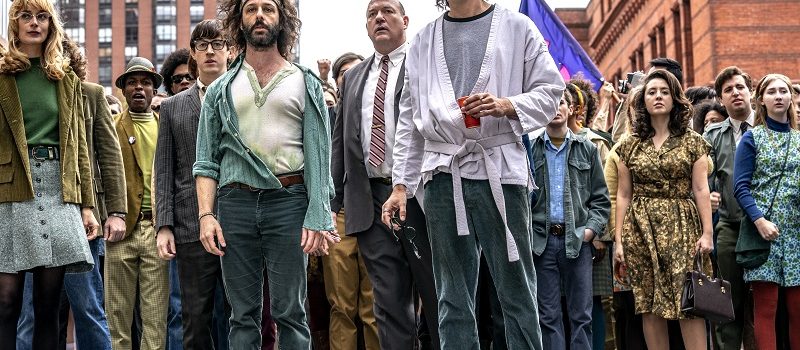There are an infinite amount of moments that deserve the spotlight in the latest film from Aaron Sorkin, The Trial of the Chicago 7. The Movie Mensch will not divulge anything from the Netflix flick that would spoil an ounce of its narrative, emotive pull, patriotic and priceless parallel to the present. The film is among the most important slices of celluloid that has arrived in this poor excuse of a year.
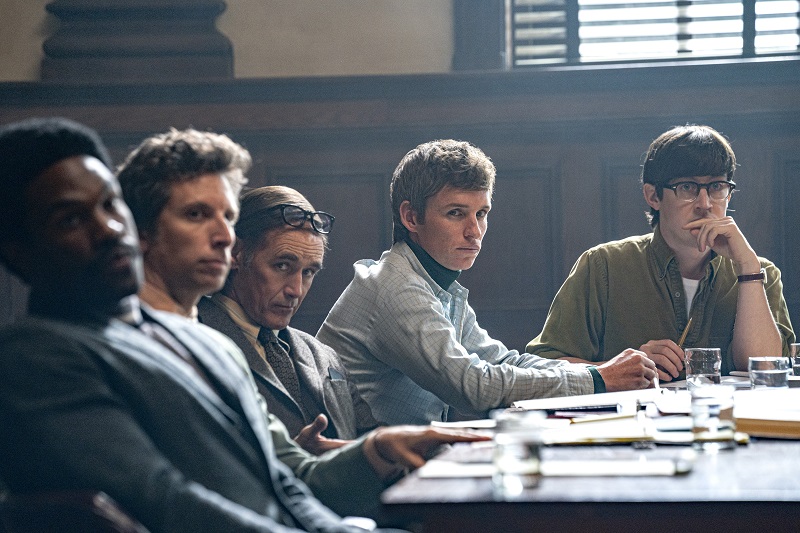
A little background for those who are not aware of the Chicago 7 and their place in history. During the 1968 Democratic Convention—that served to formally nominate Hubert H. Humphrey Jr. as the party’s candidate for the highest office in the land—a diverse group of dissenters descended on the Windy City. They sought to protest the United States’ involvement in the Vietnam War. Riots ensued, hundreds were bloodied by Chicago PD and the images shocked a nation that was already on edge, thanks to the assassination of Robert F. Kennedy in Los Angeles, Martin Luther King, Jr. in Memphis, and racial unrest across dozens of cities.
Richard Nixon would win that election and thus, there was a sea change at the Justice Department. John Newton Mitchell (John Doman) took over as Attorney General of the United States from President Lyndon Johnson’s AG, Ramsey Clark (Michael Keaton). Among Mitchell’s first acts was to push for indictments and jail time for the so-called Chicago 7 for their “role” in starting and fostering a riot.
Nixon’s AG had such disdain for Clark that this case was exclusively personal, and that comes through in Sorkin’s film like a lightning bolt. A trial would ensue (clearly, it’s in the film’s moniker!) led by a young, 33-year-old federal prosecutor, Richard Schultz (Joseph Gordon-Levitt) who sought to imprison Tom Hayden (Eddie Redmayne), Rennie Davis (Alex Sharp), Abbie Hoffman (Sacha Baron Cohen), Jerry Rubin (Jeremy Strong), David Dellinger (John Carroll Lynch), Lee Weiner (Noah Robbins), John Froines (Danny Flaherty) and an eighth, Bobby Seale (Yahya Abdul-Mateen II).
Seale, the leader of the Black Panther Party, was lumped into this group, even though he was only in Chicago for a matter of minutes—to make a speech—and was nowhere near the riot when those gathered turned from protest to panic. How Sorkin weaves Seale’s part in this horrorshow of American justice is simply, brilliant. The writer-director crafts a gut-punch of disgust from the viewer on many fronts—but most definitely on how the court and the system treated Seale. What he goes through during that trial is an impeccable encapsulation of how the law envisions African Americans. What’s so frightening is current headlines dictate that little has changed in that arena. The media gifted those charged by the federal government the Chicago 7 and as such, virtually admitted that Seale had nothing to do with this. It was merely an opportunity to put the leader of the Black Panther Party on trial and hopefully, for those on the right, to put him behind bars.
A rarely used law (at the time) was levied at these eight folks. They were collectively charged by the federal government with conspiracy, inciting to riot, and other charges related to protesting the country’s violent role in the Southeast Asian country. Defending them was a dynamic duo of William Kunstler (Mark Rylance) and Leonard Weinglass (Ben Shenkman), whose frustration with the judicial process, in this case, was palpable. Overseeing the trial was a judge whose competency—and lack of objectivity—is painfully documented by Sorkin and embodied by judge Julius Hoffman (Frank Langella). Not only is he questionably mentally fit (he cannot remember lawyers’ and defendants’ names), but his bias comes off like a flashing neon sign.
It should be no surprise that Sorkin has crafted a screenplay that is ripe with voracious verbal volleys and has tapped thespians who relished the opportunity to not only be a part of a Sorkin cinematic moment but to tell a story that American (and the world) needs to see as our citizens commence the process of the 2020 election. What is truly astonishing is how his skill set as a director has grown exponentially since his behind-the-camera debut with Molly’s Game in 2017. There is a crispness and an immediacy to every single frame that is impossible to take your eyes off of while this Trial of the Chicago 7 unfolds.
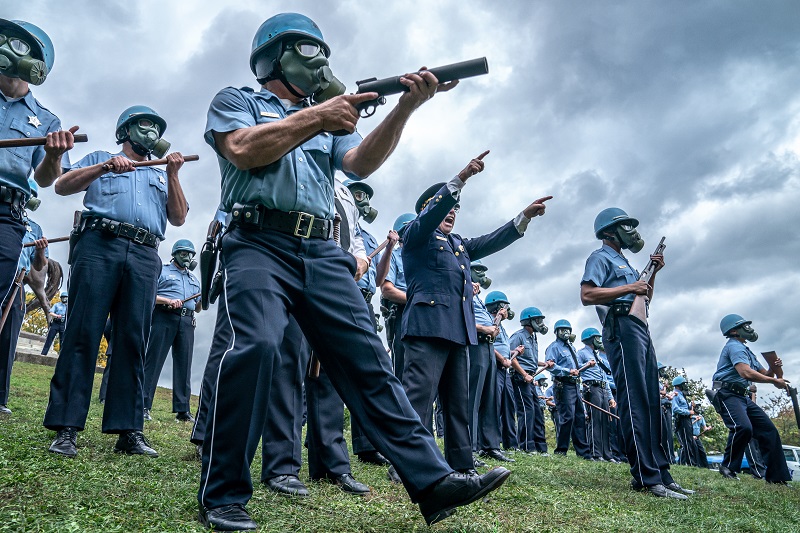
Not only has Sorkin woven a web with popping prose, as per usual for the Oscar-winning scribe, but he utilized a zig-zagging timeline mode of storytelling that would be a challenge for any filmmaker—much less one who was producing their sophomore effort. Viewers don’t experience how this group of eight came together in a traditional manner. Everything that is seen on the screen is to be viewed through the prism that is a courtroom drama. As each element of the trial progresses, the filmmaker enhances it by spotlighting the first-hand account of what truly went down.
As soon as the credits rolled, I concluded that it must have seemed a risky endeavor to deliver a non-linear method of yarn spinning. Sorkin has never held your hand with his work, regardless of what form it took. West Wing featured characters talking a mile a minute as they simultaneously weaved their way through the White House. The Social Network mirrored a verbal metronome with its sizzling speech patterns emitting from all its players. In The Trial of the Chicago 7, the writer shows unmistakable confidence in his prose creation. By going from the courtroom to Hyde Park—and other spots across Chi-town as the city became overrun by aggressive police and outwardly angry protestors who were sick over the massive loss of life in the Vietnam War—the auteur emotively enhances the seismic societal change that was starting to arise. This is all with the presidential campaign backdrop that has the “law and order” candidate (Nixon) leading in polls, while the other political party became engulfed with infighting. Sorkin’s the perfect filmmaker to bring this important historical moment in our country’s two-century-long journey as the headlines of today incredibly mirror what he is painting with his pen and camera.
The word “timely” will get tossed around frequently when The Trial of the Chicago 7 is mentioned in the press and among those watercooler conversations that help spread word-of-mouth for any pop culture entity. As hundreds of thousands of Americans took to the streets in the days after George Floyd was murdered by a Minneapolis Police Department officer, the often hardcore response by the authorities in that Minnesota city and many other municipalities across the land recalled what Chicago PD did in 1968 to protestors at the Democratic National Convention. Lots of billy clubs and very little restraint. In some scenarios, it was worse. The riot gear and vehicular defense equipment have gotten fiercer in the decades since that fateful 60’s summer. At the same time, the awareness of those taking to the streets has increased as the internet has fueled an information-seeking vacuum. Therefore, protesters are further educated and armed with knowledge than ever before, while the police are more equipped for the landscape of the battlefield than the nuances of human to human clashes.
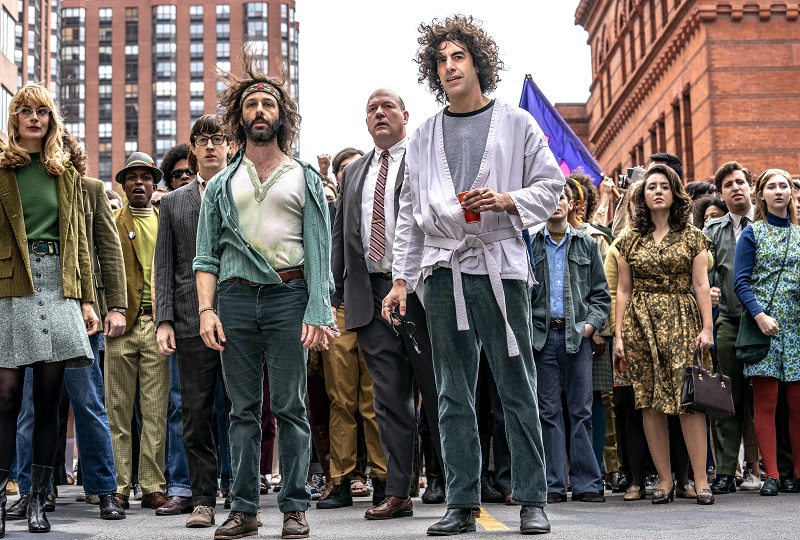
Witnessing the latest from Netflix produces the most fascinating of experiences. The film concurrently keeps its audience grounded in the past while it subconsciously sends you mentally to 2020. People are still calling for the same societal changes. It is easy to feel that we as a society have come a long way, but the day-to-day reality of the police-public relationship has intensified. The great thing about a democracy is that it is always (at least it should be) evolving, growing, and prompting its citizenry to challenge it to make it continually better and more inclusive.
The moving images in Sorkin’s film cause an uneasy sense of Deja-vu. After all, it was—at the behest of POTUS—armed thugs parading around in police uniforms that violently responded to peaceful protest in the summer of 2020. As the Chicago PD attacked peaceful demonstrators in 1968, it was painful to watch. We as Americans do not learn from our history and as such—we are doomed to repeat it. It’s like we are in a law and order/culture clash that just keeps on repeating itself. It’s sad, really. Our country had such a promise. As police crack skulls in 2020 or 1968, it makes one wonder if our collective society will ever get the message.
The ensemble cast is sublime. Redmayne’s Hayden is a revelation. It is easy to see how Hayden would become a political figure in California politics. The British Oscar winner sinks his teeth into Tom Hayden and delivers his best non-English accented character. It’s a revelation. Cohen as Hoffman is something truly extraordinary. They say comics make the greatest dramatic actors and the Borat 2 star proves that point with his portrayal of the late social activist. Now, Abbie Hoffman was a character, to put it mildly. It would have been easy to turn in a caricature of Hoffman, but Cohen digs deep and delivers a layered turn that captures not only the essence of the activist but his pragmatic nature as well. He was ready to be as radical as necessary but was also keenly aware that the key to any societal movement lay in getting the public to agree with you—usually via a news camera. I could have watched a Hoffman biopic for two and a half hours if it were Cohen at the center of it.
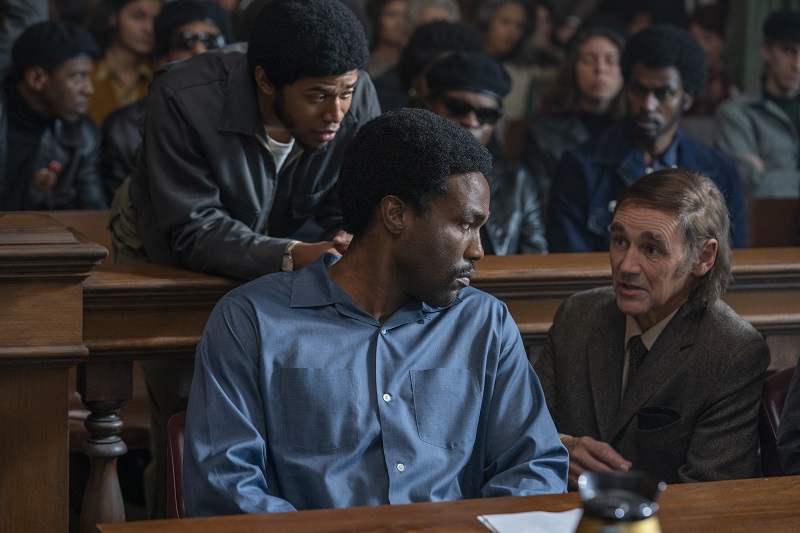
Abdul-Mateen II as Seale works on a myriad of levels. This was a man who wore his persecution on his sleeve, sometimes proudly, oftentimes frustratingly. He wondered (out loud) why he was even a part of this trial and how the court treated him will enrage you, just a warning. The actor embodies an American hero long before he would be seen that way. It is a stirring performance that would make the Black Panther leader proud. Strong as Rubin is the performance that will have you thinking about him late at night when you can’t sleep. He does something incredible as he tackles the soul as someone who could easily be seen as aloof, but meanwhile, he is firmly aware of what he is doing at all times. He knows that words have meaning and power and that his are selected carefully is just one spoke in the complicated wheel that is his persona. Strong sizzles in the role in the most surprising of ways.
Gordon-Levitt is one conflicted character. He is a young District Attorney who was personally tapped by the Attorney General to pursue this case. To even get charges filed in the manner that the AG wanted, was a longshot. Not only did Schultz orchestrate a legal hail Mary and score charges against these “Seven plus one,” but he managed a trial that could also serve as a means for putting the anti-war movement and racial protests on trial. It was the latter that made him grossly uncomfortable and the actor’s command of that aspect is what most resonates.
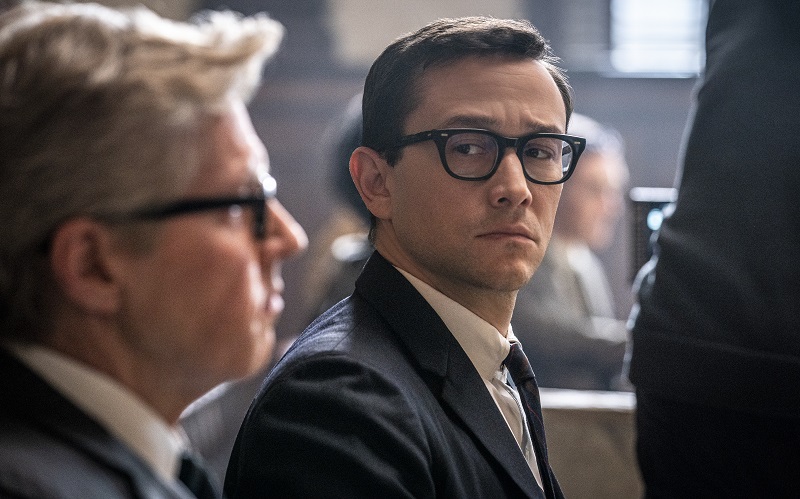
On the other side of the trial is Rylance as the defense attorney Kunstler. There is a sensitivity there that is oh-so needed as the man is representing seven folks from all different walks of life and an eighth who doesn’t understand why he is even there. Seale’s attorney was stuck in Oakland and couldn’t make the trial in Chicago. The activist knew that his grounds for any kind of appeal lay in his lack of representation. Kunstler’s help is nice, but any appearance of him receiving legal aid from the defense attorney goes against everything he’s stated since the commencement of the trial—he was charged and tried without a lawyer. Rylance also comes across as the most educated of circus masters. The accused—from the show business nature of Hoffman to Lynch’s Dellinger, who is all business—are all managed by Kunstler. It’s a thankless challenge for a lawyer and the actor charged with portraying him.
The Trial of the Chicago 7 has Academy Awards written all over it. There is no question it will score a Best Picture and Best Original Screenplay nomination. When it comes to acting nods, it will depend on how Netflix chooses to put forth its thespians. Will Cohen be in the Best Actor category, or is everyone all Best Supporting Actors? If that is the case, it won’t happen, but The Trial of the Chicago 7 deserves to have that category all to itself.
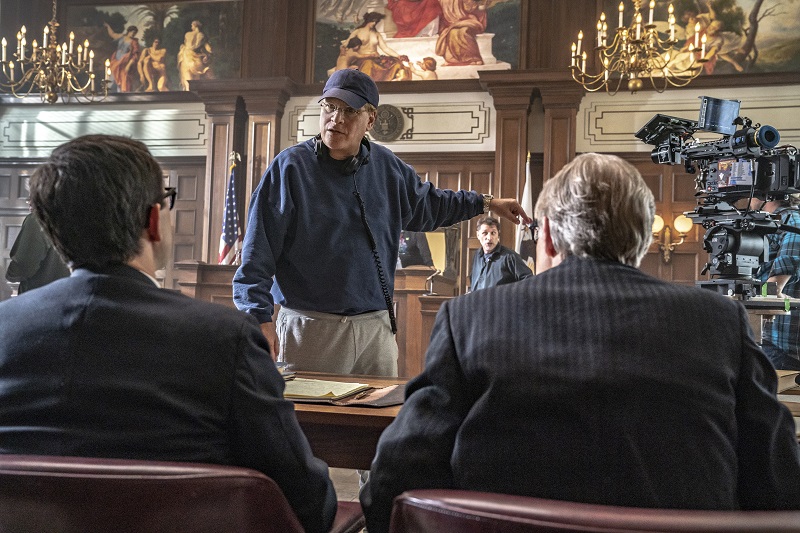
Sorkin has truly come into his own as a filmmaker with his latest film. I was one of those who adored Molly’s Game. He makes an enormous leap with his second directorial effort. It is a story with a much more massive scope and its complex nature could trip up even seasoned directors. Yet Sorkin, in fact, seems to take this challenge to heart and what he has done bringing his own screenplay to life is nothing short of cinematic bliss. His writing is as fierce as ever and he clearly has the ensemble to take his prose and deliver it to new heights. Netflix’s film is firmly a Sorkin tsunami but takes an added level of awesomeness with his new(er) trait of filmmaking mastery.
Grade: A+

